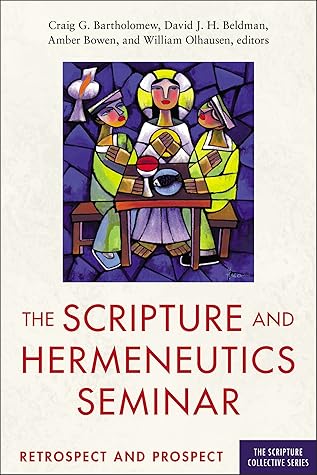Kindle Notes & Highlights
by
Zondervan
Read between
November 12, 2022 - January 9, 2023
Hermeneutics concerns itself with the task of hearing afresh the communicative word – the wonder and mystery of language in and through time. Hermeneutics involves attentive listening, which Jean-Louis Chrétien evocatively describes as the “first act” of “hospitality.”1 When it comes to biblical hermeneutics, we are concerned with extending this hospitality to the biblical texts. For the SAHS, this hospitality is above all to the Word made flesh disclosed in the witness of the texts of Scripture, which Dei Verbum rightly calls the “pure and everlasting source of spiritual life.”2
Through its critique of modernity, postmodernism opened the door, in principle at least, for Christian faith to play an integral role in academic biblical interpretation. We hoped that close attention to philosophical hermeneutics in an interdisciplinary Christian context would provide a matrix for retaining the rigour of biblical interpretation while directing it towards listening for God’s address.
As a result, the SAHS’s primary distinctive in its early years was a sustained attempt to engage the field of biblical hermeneutics from the perspective of philosophical hermeneutics, Christian theology, and interdisciplinarity.
the mission statement of the KLC, which is committed to “Christian scholarship and public theology, rooted in spirituality and practised in community, for the glory of God and the flourishing of the church in the world.”
The literary turn, and the postmodern turn with its wild pluralism, brought trenchant critiques to bear on historical criticism. However, to a large extent they left the foundation of human autonomy firmly in place, so that historical criticism remained the default mode of interpretation. Nevertheless, the loosening of the regnant paradigm in biblical studies for over a hundred years – historical criticism of one form or another – did provide the space for the exploration of fresh approaches and for reconceiving biblical interpretation so that it invited us to the feast of Scripture.
once Childs grasped the profundity of Barth’s work he spent the rest of his life attempting to redo biblical studies along Barthian lines, and the results were exhilarating.
In my view deeper work needed to be done to overcome the gap between ecclesial reception of the Bible as God’s Word and rigorous, academic biblical scholarship.
Hans-Georg Gadamer (1900–2002), the father of modern philosophical hermeneutics, in his magisterial Truth and Method12 alerts us to the limits of a “right method” approach to interpretation. He emphasizes these limits so much so that some have suggested his book should be entitled Truth or Method or Truth Against Method. However, Gadamer does not reject method but resituates it within a dialogue13 between reader and text. The opening section of Truth and Method explains how we engage with an artwork, dialoguing back and forth until a fusion of horizons takes place.
John Barton’s inaugural volume at Oxford was wary of the calls for a religious hermeneutic in biblical studies,18 and more recently he insists that theology should be bracketed out of biblical criticism.19 From the outset we have argued the reverse; if the Christian faith is true, then all its resources need to be leveraged in the search for truthful interpretation of the Bible.
An element in Seitz’s argument, which was and is central to the SAHS’s mission, is that none of us thought the answer to the current challenges was to retreat behind modern biblical interpretation into pre“critical”26 exegesis.
Sundberg explores the political context of academic biblical interpretation and its social implications for the church as a faith community. He fingers – indeed, embodies in his essay – the enduring tension between critical interpretation and faith as central to the crisis. Sundberg’s solution is for us to teach biblical criticism comprehensively: its history, its effects, and its presuppositions.
With a focus on Amos, Karl Möller closely attends to the different views of historical criticism and pleads for retaining an historical emphasis in biblical studies, with a renewal of historical criticism such that it is genuinely open to transcendence.
Any renewal of biblical interpretation must wrestle with the unity and diversity of Scripture. Biblical theology is that discipline which seeks to articulate the unity of the Bible according to its own categories,
A truly astonishing phenomenon of our time is the emergence of French Catholic phenomenology, with its range across theology and philosophy and its unashamed drawing on the Bible in the process.
I believe that the primary place for the reception of the Bible is in the church. Academic work makes a huge contribution, if done well, but it is a secondary activity.
When it came to the Bible, Newbigin thought that both liberals and conservatives had succumbed to the metanarrative of modernity. He approached George Caird at Oxford for help in a recovery of the Bible. Caird replied, “You are asking for a total revolution in the way biblical scholars see their job.”39 My sense is that both Newbigin and Caird were right. A paradigm shift is required. Above all, God addresses us in and through the Bible, and we need not refuse – indeed we should welcome – that address in our lives and in our scholarship.
Gadamer did not deny the role of method, but he resituated it within dialogue. You pose your questions to the artwork, and you see how it “responds.” To and fro the dialogue goes until your “horizon” fuses with that of the artwork in the act of understanding.
As Gadamer saw it, the mistake of much modern thought was to assert that if we only get the method right, then we will arrive at the truth.


